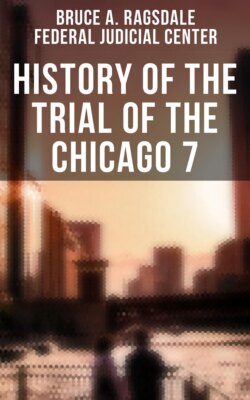Читать книгу History of the Trial of the Chicago 7 - Bruce A. Ragsdale - Страница 56
На сайте Литреса книга снята с продажи.
Richard J. Daley (1902-1976)
ОглавлениеTable of Contents
Mayor of Chicago
Mayor Richard J. Daley on the fl oor of the Democratic National Convention
Associated Press, 1968
By 1968, Richard J. Daley had been mayor for more than twenty years, and for much of the nation he was the very image of modern Chicago. After service in the Illinois legislature and state government under Governor Adlai Stevenson, Daley became chair of the Cook County Democratic Central Committee in 1953 and was elected mayor two years later. As mayor and party leader, he commanded an extensive organization that ensured his reelection and helped him efficiently deliver municipal services. Daley also promoted investments in major public works and private construction that helped maintain Chicagos status among American cities. His political influence made him an important player in national Democratic politics. By the time of the Democratic convention, however, Daley’s style of urban leadership was an anachronism and subject to charges of cronyism and machine politics.
Daley’s reputation suffered a serious blow in the spring of 1968 during the riots that followed the assassination of Martin Luther King. The mayor asked the police superintendent to order police to shoot to kill any arsonist and to shoot to maim looters. A national outcry followed. In 1968, Daley’s administration was determined to prevent any kind of civil disturbance during the Democratic convention, and officials refused to issue permits requested by demonstrators. The mayor’s administration also mobilized an over-whelming force of police and National Guard troops to maintain order in the city.
National media covering the convention criticized the police response to the demonstrators, and the television networks broadcast Daley’s remarkable tantrum on the floor of the convention. Daley responded to the public criticism with a hastily prepared report that blamed the convention violence on “outside agitators” and a “hard core of revolutionaries.”
In January 1970, Mayor Daley appeared as a witness for the defense, but his testimony did little to support the defense argument. Daley insisted he had not ordered the denial of permits for demonstrators, but for the most part Daley offered little beyond praise for his staff and U.S. Attorney Foran. Judge Hoffman sustained most of the prosecution’s objections to the defense line of questioning of Daley. Defense attorney Kunstler read into the record an “offer of proof,” which allows an attorney to present, away from the presence of the jury, information that the judge had not allowed them to present through examination of a witness. Kunstler’s order of proof alleged a conspiracy of Daley and President Johnson, with the cooperation of the U.S. attorney, to prevent any demonstrations against the Vietnam War and social injustice.
Despite the damage to his national reputation following the events of 1968, Daley remained popular in much of Chicago and won reelection to a sixth term in 1975.
